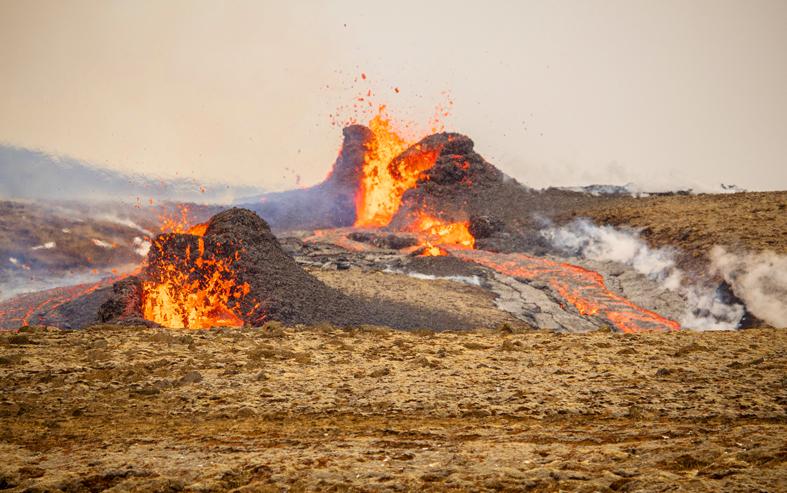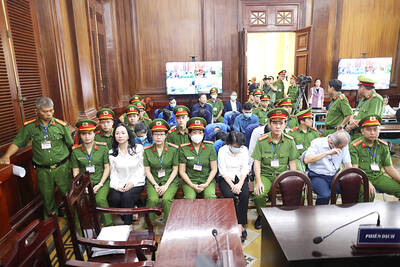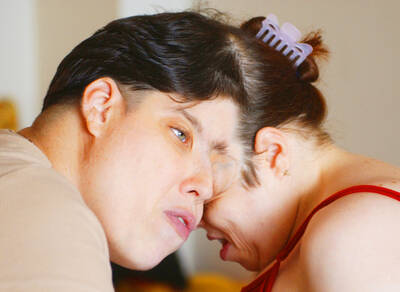Steam and lava on Monday spurted from a new fissure on an Icelandic volcano that began erupting last month, prompting the evacuation of hundreds of hikers who had come to see the spectacle.
The new fissure, first spotted by a sightseeing helicopter, was about 500m long and about 1km from the original eruption site in the Geldinga Valley.
The Icelandic Department of Emergency Management announced an immediate evacuation of the area, saying that there was no imminent danger to life due to the site’s distance from popular hiking paths.

Photo: AP
The new volcanic activity was not expected to affect traffic at nearby Keflavik Airport, the Icelandic Meteorological Office said.
The long-dormant volcano on the Reykjanes Peninsula in southwest Iceland flared to life on March 20 after tens of thousands of earthquakes were recorded in the area in the past three weeks.
It was the area’s first volcanic eruption in nearly 800 years.
Live footage from the area showed small spouts of lava coming from the new fissure.
Geophysicist Magnus Gudmundsson said that the volcanic eruption could be moving north from its original location.
“We now see less lava coming from the two original craters,” he said. “This could be the beginning of a second stage.”
Iceland, located above a volcanic hot spot in the North Atlantic, averages one volcanic eruption every four to five years.

Republican US lawmakers on Friday criticized US President Joe Biden’s administration after sanctioned Chinese telecoms equipment giant Huawei unveiled a laptop this week powered by an Intel artificial intelligence (AI) chip. The US placed Huawei on a trade restriction list in 2019 for contravening Iran sanctions, part of a broader effort to hobble Beijing’s technological advances. Placement on the list means the company’s suppliers have to seek a special, difficult-to-obtain license before shipping to it. One such license, issued by then-US president Donald Trump’s administration, has allowed Intel to ship central processors to Huawei for use in laptops since 2020. China hardliners

A top Vietnamese property tycoon was on Thursday sentenced to death in one of the biggest corruption cases in history, with an estimated US$27 billion in damages. A panel of three hand-picked jurors and two judges rejected all defense arguments by Truong My Lan, chair of major developer Van Thinh Phat, who was found guilty of swindling cash from Saigon Commercial Bank (SCB) over a decade. “The defendant’s actions ... eroded people’s trust in the leadership of the [Communist] Party and state,” read the verdict at the trial in Ho Chi Minh City. After the five-week trial, 85 others were also sentenced on

Conjoined twins Lori and George Schappell, who pursued separate careers, interests and relationships during lives that defied medical expectations, died this month in Pennsylvania, funeral home officials said. They were 62. The twins, listed by Guinness World Records as the oldest living conjoined twins, died on April 7 at the Hospital of the University of Pennsylvania, obituaries posted by Leibensperger Funeral Homes of Hamburg said. The cause of death was not detailed. “When we were born, the doctors didn’t think we’d make 30, but we proved them wrong,” Lori said in an interview when they turned 50, the Philadelphia Inquirer reported. The

RAMPAGE: A Palestinian man was left dead after dozens of Israeli settlers searching for a missing 14-year-old boy stormed a village in the Israeli-occupied West Bank US President Joe Biden on Friday said he expected Iran to attack Israel “sooner, rather than later” and warned Tehran not to proceed. Asked by reporters about his message to Iran, Biden simply said: “Don’t,” underscoring Washington’s commitment to defend Israel. “We are devoted to the defense of Israel. We will support Israel. We will help defend Israel and Iran will not succeed,” he said. Biden said he would not divulge secure information, but said his expectation was that an attack could come “sooner, rather than later.” Israel braced on Friday for an attack by Iran or its proxies as warnings grew of